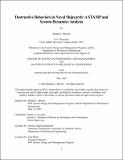Destructive Behaviors in Naval Shipyards: A STAMP and System Dynamics Analysis
Author(s)
Brower, Braden C.
DownloadThesis PDF (3.420Mb)
Advisor
Leveson, Nancy G.
Terms of use
Metadata
Show full item recordAbstract
United States Navy Refueling and Complex Overhauls (RCOHs), and other extended maintenance availabilities, present uniquely demanding environments where Sailors face elevated risks for destructive behaviors, including suicide and substance abuse. Prolonged exposure to harsh industrial conditions, significantly degraded Quality of Service, demanding workloads, and critical manning shortfalls create cumulative stress distinct from operational duty. These destructive behaviors severely impact personnel’s well-being, erode force readiness through attrition and morale issues, and indicate systemic contributing factors as highlighted by recent investigations into carrier suicides during shipyard periods.
This thesis utilizes Causal Analysis based on Systems Theory (CAST), grounded in systems thinking, to analyze the USS George Washington RCOH events and identify the underlying safety control structure flaws that contributed to this hazardous environment. Insights from the CAST analysis were then integrated with a qualitative System Dynamics model to better understand the feedback loops and dynamic interactions driving system behavior, particularly revealing a capability trap dynamic exacerbated by resource constraints and personnel pressures.
The analysis identified critical, interacting systemic flaws across multiple organizational levels that contributed to the accident: (a) inadequate strategic resourcing and manning prioritization for RCOH personnel support, (b) deficient planning, risk management, and oversight processes that were ineffective at protecting Sailor well-being amidst budget and schedule pressures, (c) ineffective feedback mechanisms that prevented critical information from reaching decision-makers, (d) and reliance on flawed assumptions regarding the RCOH environment, Sailor resilience, and standard process adequacy. Based on these findings, the thesis provides actionable, systemically focused recommendations aimed at strengthening the Navy's safety control structure by improving decision makers’ mental models, enhancing feedback and oversight, enforcing well-being constraints, and fostering organizational learning. Combined, these recommendations empower leaders to proactively manage risks, reduce destructive behaviors, and ensure a safer, more resilient environment during future RCOHs.
Date issued
2025-05Department
Massachusetts Institute of Technology. Department of Mechanical Engineering; System Design and Management Program.Publisher
Massachusetts Institute of Technology